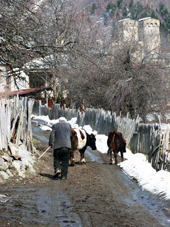Opening Ceremony of the Project for “Construction of Rehabilitation Center for Persons with Disabilities in Mestia Municipality” of “Grassroots and Human Security Grant Assistance Programme” provided by the Government of Japan
Monday, September 2


The Grant Contract of the above-mentioned project was concluded on February 8, 2018, between the Embassy of Japan and Together for Real Changes (TRC). Under this project, Japan has provided a grant for construction of the first Rehabilitation Center for persons with disabilities, in Samegrelo-Zemo Svaneti Region. The project has allowed to provide access to rehabilitation services for over 100 persons, for the first time in Samegrelo-Zemo Svaneti Region, increasing the quality of life for the local population. The grant amount for this project amounts to 86’271 USD.
The “Grant Assistance for Grassroots and Human Security Projects” (GGP) provides assistance to relatively small projects implemented by municipalities, medical/educational institutions, as well as NGOs and aims at improving the living standards of Georgian people. Within 20 years of its work in Georgia - from 1998 to 2018, the Grassroots Human Security Program (GGP) of the Government in Japan funded 170 projects, in total amounting to more than 17 million USD (17’171’529 USD). Through this funding, dozens of schools, kindergartens, hospitals were rehabilitated and re-equipped – providing essential services to the most vulnerable population; agriculture infrastructure was developed, alleviating poverty in some of the poorest villages; thousands of hectares of land were cleared from hazardous landmines, saving lives of local population.
